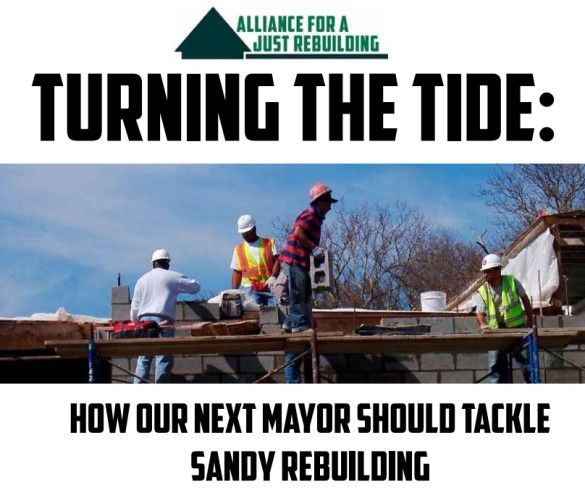Alliance For A Just Rebuilding Wants Justice And Fairness When It Comes To Sandy Recovery

A coalition of labor unions, community groups, environmental groups and faith-based organizations have banded together to form the Alliance For A Just Rebuilding (AJR). The goal of the AJR is to make sure the federal dollars sent to New York City via the Sandy aid package are distributed equitably with an emphasis on creating jobs for struggling communities, low-income residents and minorities.
In a brief entitled “Turning the Tide: How Our Next Mayor Should Tackle Sandy Rebuilding” the AJR lists 41 organizations and groups that support their platform, including the Coalition for the Homeless, Occupy Sandy, National Day Laborer Organizing Network and the Pratt Center for Community Development, just to name a few. Citing the $51 billion expected to flow into the city via Community Development Block-Grant Disaster Recovery (CDBG-DR) funds and other investments and donations, the AJR believes that the next mayor, whoever that may be, has an unprecedented responsibility to make sure that the funds are properly spent.
The AJR outlines four major objectives for the next mayor and the first one starts with a call for a strong local jobs program. Highlights of their jobs program proposal include making sure that every Sandy-related construction or recovery job pays an equitable living wage, especially in cases of smaller construction projects, where abuse is widespread. They also want to make sure that all city agencies make public every Sandy-related contract, listing the status updates, jobs promised and created, the wages for said jobs and a public comment process for all projects over $1 million in public funds. They also want to make sure that lower-income, Sandy devastated communities have the top priority in infrastructure repair and expanded transportation options.
The second major objective in the AJR brief calls for the future mayor to restore lost affordable housing while creating new affordable housing for displaced storm victims. Calling for a comprehensive assessment of unmet housing needs, the AJR wants more federal dollars to match the true level of destroyed housing units. They also want to make sure that any restored housing remains affordable:
The City can and should require landlords who use public dollars to rebuild their homes to maintain affordability at pre-storm levels – in contrast to the price gouging that now plagues Sandy-affected neighborhoods. Publicly-funded recovery must not be used to price out Sandy victims from their communities. In dialogue with advocates, City officials have indicated that they share these goals; the next mayor must support them with strong policy and collaborative problem-solving with community groups.
The third priority listed calls for the mayor to invest and in a clean and sustainable energy infrastructure. Citing the $3 billion the state controls in energy investment, plus the $300 million set aside in CDBG-DR funds, the AJR is demanding that the next mayor focus the spending of this money on low-income and storm-vulnerable locations for the purpose of creating a clean energy infrastructure. Here are three major bullet points presented by the AJR.
Fix NYCHA’s flooded energy systems with greener, cheaper, more resilient power.
Implement a post-Sandy recovery plan to upgrade NYCHA buildings to Combined Heat & Power (cogeneration) – which can cut energy costs by 30-50% – and work with HUD to redirect savings to fund NYCHA repairs.
Use CDBG and other state funds to support green, low-cost, non-profit power generation with community ownership in storm-affected neighborhoods.
New York City housing developments like Penn South and Co-op City have long shown that community-owned cogeneration works to power housing, schools, and businesses while lowering costs – now it’s time to add public support to help communities move toward cogeneration.
Champion racial and economic fairness in state-level energy policy.
Advocate for legislation to reform the NYS Public Service Commission (PSC) so that it serves communities, not utilities.
1. Require the PSC to account for equitable economic impacts in allocating billions in energy infrastructure dollars, including jobs, training and uneven energy cost burdens on low- and moderate-income communities; and meet state contracting standards for Minority Business Enterprises (MBEs) while supporting contractors to meet good job standards.
2. Create a “climate justice fund” for investment in low-income communities vulnerable to climate events.
The last policy point put forward by the AJR consists of calling for the next mayor to more directly engage communities in future planning of Sandy related recovery programs. Citing that community-based organizations played a critical role following the devastation of the storm, the AJR is asking that the mayor build stronger relationships with community groups and figure out better ways to coordinate with them, so that the needs of neighborhoods are heard and weaknesses in their overall disaster preparedness plans can be better identified. Some of their ideas to better engage communities is to direct Sandy funds to community-based planning and recovery work, and to steer the practice of holding community “idea competitions” towards “idea cooperation.” They also want to bring community groups and volunteers to a more central and critical role to help in recovery, planning and preparedness projects.
Regardless if you disagree with the details presented by the AJR or even their overall message, they raise the undeniable fact that the next mayor will probably inherit one of the most critical and delicate roles in the city’s history. That mayor will be responsible for adeptly spending the federal dollars sent for recovery, organizing that process and making wise decisions to better brace the city and its people for a future disaster, both economically and physically.
You can read the entire AJR report by clicking here.




